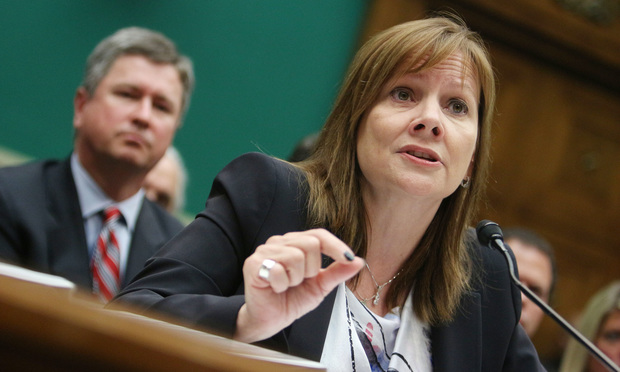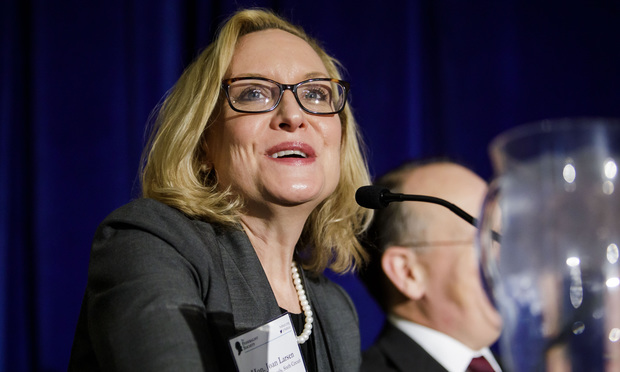US Appeals Court Scraps Order Forcing CEOs of GM, Fiat Chrysler to Meet for Settlement Chat
"The district judge did not consider or try the lesser alternative of permitting the parties and their counsel to select their own corporate representatives," the U.S. Court of Appeals for the Sixth Circuit said.
July 06, 2020 at 06:21 PM
5 minute read
 GM CEO Marry Barra. Credit: Diego M. Radzinschi/ ALM
GM CEO Marry Barra. Credit: Diego M. Radzinschi/ ALM
A federal appeals court late Monday said a Michigan trial judge went too far when he ordered the chief executive officers of General Motors and Fiat Chrysler to meet face to face to talk about how to resolve a racketeering lawsuit that pits the automotive giants against each other.
The U.S. Court of Appeals for the Sixth Circuit issued a rare order to block the court-ordered meeting of GM's CEO Mary Barra and FCA's CEO Michael Manley. The initial order from the trial judge, Paul Borman, said only the CEOs would be required to meet. Borman later amended his order to allow an attorney for each side.
But the planned addition of counsel wasn't enough. Courts have many tools to manage their "busy dockets," the appeals court said, and judges "may consider and take appropriate action on settling the case." But dictating which corporate representative must participate at a pretrial conference was outside the judge's authority.
"The district judge did not consider or try the lesser alternative of permitting the parties and their counsel to select their own corporate representatives and allowing them to confer with one another by any reasonable means, including by telephone or videoconference," a three-judge panel of the Sixth Circuit said.
The panel added: "The district judge accordingly failed to provide legally adequate reasons to establish that it was appropriate to order the CEOs personally to meet face-to-face to consider a possible settlement."
GM last year sued Fiat Chrysler in the U.S. District Court for the Eastern District of Michigan. The complaint alleged Fiat Chrysler had "bribed United Auto Workers (UAW) union officials over many years to corrupt the bargaining process and gain advantages, costing GM billions of dollars," according to Reuters. Fiat Chrysler has resisted the claims and moved to dismiss the complaint.
Borman had called the dispute between the two companies a "distraction" in the middle of pressing social justice and health safety concerns. The litigation between the two companies, Borman said, was preventing their leaders "from fully providing their vision and leadership" on issues associated with racial justice and COVID-19.
 Judge Joan Larsen, of the U.S. Court of Appeals for the Sixth Circuit. Credit: Diego M. Radzinschi / ALM
Judge Joan Larsen, of the U.S. Court of Appeals for the Sixth Circuit. Credit: Diego M. Radzinschi / ALMThose reasons, the appeals court said Monday, "are not related to settling the issues specific to this case." Judges Richard Suhrheinrich, Ronald Lee Gilman and Joan Larsen issued the ruling.
Kirkland & Ellis partner Paul Clement led the challenge for GM at the appeals court. "That unprecedented order is a profound abuse of the power and the critically important, but essentially limited, office of the federal judiciary," Clement told the Sixth Circuit.
Clement continued: "The health and social justice crises besetting our nation are undoubtedly issues that demand attention. But it is not within the power or properly limited office of an Article III judge charged with impartially adjudicating a federal cause of action Congress deemed worthy of judicial resources to label that action a 'distraction.'"
Lawyers from the law firms Sullivan & Cromwell and Miller, Canfield, Paddock and Stone advocated for Fiat Chrysler at the appeals court.
"Judge Borman's order that the parties explore settlement in no way warrants reproach, let alone the extreme sanction of having him removed from the case, which can be justified only where a court has plainly abused its power," Steven Holley, co-leader of Sullivan & Cromwell's antitrust group, told the appeals court. "GM may be unhappy about questions Judge Borman posed during oral argument that bore upon the validity of GM's claims—claims FCA believes are wholly meritless—but asking tough questions is a court's mandate; it is hardly grounds for a judge to be removed from a case."
Responding to the appeals court before it ruled, Borman, a federal trial judge since 1994, defended his order.
Borman said he would have asked the two CEOs, during an on-the-record pretrial teleconference, a "yes" or "no" question about whether they had met in person to discuss a settlement.
"Thereafter, the court will then request that their counsel read a jointly prepared limited statement of the results of the Mary Barra-Michael Manley meeting: 'Yes,' they have reached a resolution of the case, or 'No,' they have been unable to reach a resolution of this case," Borman told the appeals court. "The court will not request, or permit the parties or their counsel to discuss this matter further in the teleconference."
The appeals judges refused Clement's request to assign the case to a different judge.
"The district judge's desire for a quick settlement is not so extreme as to call for such a remedy," the appeals court said. "Contrary to GM's claim, neither the comments nor the conduct of the district judge 'establishes that he would not be able to decide fairly this factually complicated case upon remand.'"
This content has been archived. It is available through our partners, LexisNexis® and Bloomberg Law.
To view this content, please continue to their sites.
Not a Lexis Subscriber?
Subscribe Now
Not a Bloomberg Law Subscriber?
Subscribe Now
NOT FOR REPRINT
© 2025 ALM Global, LLC, All Rights Reserved. Request academic re-use from www.copyright.com. All other uses, submit a request to [email protected]. For more information visit Asset & Logo Licensing.
You Might Like
View All
Recent FTC Cases Against Auto Dealers Suggest Regulators Are Keeping Foot on Accelerator
6 minute read
'New Circumstances': Winston & Strawn Seek Expedited Relief in NASCAR Antitrust Lawsuit
3 minute read
Cars Reach Record Fuel Economy but Largely Fail to Meet Biden's EPA Standard, Agency Says

Law Firms Mentioned
Trending Stories
- 111th Circuit Rejects Trump's Emergency Request as DOJ Prepares to Release Special Counsel's Final Report
- 2Supreme Court Takes Up Challenge to ACA Task Force
- 3'Tragedy of Unspeakable Proportions:' Could Edison, DWP, Face Lawsuits Over LA Wildfires?
- 4Meta Pulls Plug on DEI Programs
- 5On the Move and After Hours: Meyner and Landis; Cooper Levenson; Ogletree Deakins; Saiber
Who Got The Work
Michael G. Bongiorno, Andrew Scott Dulberg and Elizabeth E. Driscoll from Wilmer Cutler Pickering Hale and Dorr have stepped in to represent Symbotic Inc., an A.I.-enabled technology platform that focuses on increasing supply chain efficiency, and other defendants in a pending shareholder derivative lawsuit. The case, filed Oct. 2 in Massachusetts District Court by the Brown Law Firm on behalf of Stephen Austen, accuses certain officers and directors of misleading investors in regard to Symbotic's potential for margin growth by failing to disclose that the company was not equipped to timely deploy its systems or manage expenses through project delays. The case, assigned to U.S. District Judge Nathaniel M. Gorton, is 1:24-cv-12522, Austen v. Cohen et al.
Who Got The Work
Edmund Polubinski and Marie Killmond of Davis Polk & Wardwell have entered appearances for data platform software development company MongoDB and other defendants in a pending shareholder derivative lawsuit. The action, filed Oct. 7 in New York Southern District Court by the Brown Law Firm, accuses the company's directors and/or officers of falsely expressing confidence in the company’s restructuring of its sales incentive plan and downplaying the severity of decreases in its upfront commitments. The case is 1:24-cv-07594, Roy v. Ittycheria et al.
Who Got The Work
Amy O. Bruchs and Kurt F. Ellison of Michael Best & Friedrich have entered appearances for Epic Systems Corp. in a pending employment discrimination lawsuit. The suit was filed Sept. 7 in Wisconsin Western District Court by Levine Eisberner LLC and Siri & Glimstad on behalf of a project manager who claims that he was wrongfully terminated after applying for a religious exemption to the defendant's COVID-19 vaccine mandate. The case, assigned to U.S. Magistrate Judge Anita Marie Boor, is 3:24-cv-00630, Secker, Nathan v. Epic Systems Corporation.
Who Got The Work
David X. Sullivan, Thomas J. Finn and Gregory A. Hall from McCarter & English have entered appearances for Sunrun Installation Services in a pending civil rights lawsuit. The complaint was filed Sept. 4 in Connecticut District Court by attorney Robert M. Berke on behalf of former employee George Edward Steins, who was arrested and charged with employing an unregistered home improvement salesperson. The complaint alleges that had Sunrun informed the Connecticut Department of Consumer Protection that the plaintiff's employment had ended in 2017 and that he no longer held Sunrun's home improvement contractor license, he would not have been hit with charges, which were dismissed in May 2024. The case, assigned to U.S. District Judge Jeffrey A. Meyer, is 3:24-cv-01423, Steins v. Sunrun, Inc. et al.
Who Got The Work
Greenberg Traurig shareholder Joshua L. Raskin has entered an appearance for boohoo.com UK Ltd. in a pending patent infringement lawsuit. The suit, filed Sept. 3 in Texas Eastern District Court by Rozier Hardt McDonough on behalf of Alto Dynamics, asserts five patents related to an online shopping platform. The case, assigned to U.S. District Judge Rodney Gilstrap, is 2:24-cv-00719, Alto Dynamics, LLC v. boohoo.com UK Limited.
Featured Firms
Law Offices of Gary Martin Hays & Associates, P.C.
(470) 294-1674
Law Offices of Mark E. Salomone
(857) 444-6468
Smith & Hassler
(713) 739-1250










